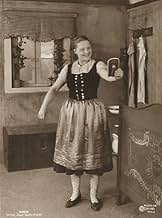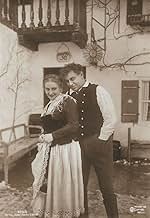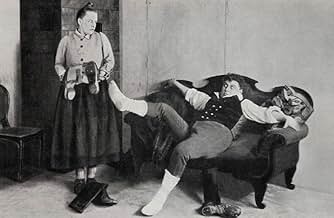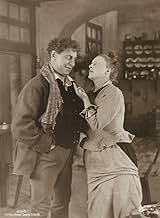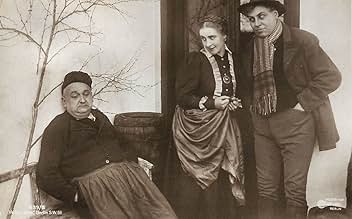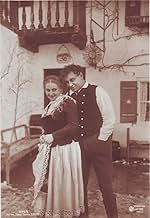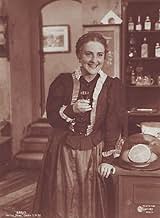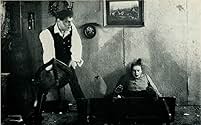Ajouter une intrigue dans votre langueIn Southern Bavaria, Xaver wants to marry Gretel, but her father Kohlhiesel insists his elder daughter Liesel marry first. Liesel is shunned as too brutal. Seppel suggests marrying Liesel fi... Tout lireIn Southern Bavaria, Xaver wants to marry Gretel, but her father Kohlhiesel insists his elder daughter Liesel marry first. Liesel is shunned as too brutal. Seppel suggests marrying Liesel first, ridding her, then wedding Gretel.In Southern Bavaria, Xaver wants to marry Gretel, but her father Kohlhiesel insists his elder daughter Liesel marry first. Liesel is shunned as too brutal. Seppel suggests marrying Liesel first, ridding her, then wedding Gretel.
- Réalisation
- Scénario
- Casting principal
Jakob Tiedtke
- Mathias Kohlhiesel - Wirt des 'Dorfkruges'
- (as Jacob Tiedke)
Gustav von Wangenheim
- Paul Seppl
- (as Gustav v. Wangenheim)
Willy Prager
- Der Handelsmann
- (as Willi Prager)
Avis à la une
To us Yanks, Ernst Lubitsch is probably most recognizable as the director of Golden Age classics like "Ninotchka", and for his so-called Lubitsch touch (wherein comedy often derived from ambiguity, possibly implying some innuendo).
We might not know that Lubitsch had a prominent career in Germany before moving to the US. He started out as an actor, starring in a series of now-controversial comedies playing what was seen as a stereotypical Jew. He then turned to directing. His biggest success was 1920's "Kohlhiesels Töchter" ("Kohlhiesel's Daughters" in English).
It depicts Gretel, a woman in old Bavaria who wants to get married. Unfortunately, tradition states that the older sister must be the first to get married. Given the contrast between the charming Gretel and the abrasive older sister Liesel, this will be no easy task. But there's a man who thinks that there might be a way to do it. A questionable one, that is.
The movie's nothing special but I thought that it was interesting enough to sit in front of for an hour (specifically, I watched it on Wikipedia). I suspect that it will mostly be of interest to completists; in my case, I've been trying to find a lot of silent movies to watch recently. Okay, not great.
We might not know that Lubitsch had a prominent career in Germany before moving to the US. He started out as an actor, starring in a series of now-controversial comedies playing what was seen as a stereotypical Jew. He then turned to directing. His biggest success was 1920's "Kohlhiesels Töchter" ("Kohlhiesel's Daughters" in English).
It depicts Gretel, a woman in old Bavaria who wants to get married. Unfortunately, tradition states that the older sister must be the first to get married. Given the contrast between the charming Gretel and the abrasive older sister Liesel, this will be no easy task. But there's a man who thinks that there might be a way to do it. A questionable one, that is.
The movie's nothing special but I thought that it was interesting enough to sit in front of for an hour (specifically, I watched it on Wikipedia). I suspect that it will mostly be of interest to completists; in my case, I've been trying to find a lot of silent movies to watch recently. Okay, not great.
I've really enjoyed this movie. It's one of the funniest movies I've ever seen. The characters, though highly stereotypical, are of a refreshing simplicity. Even for a silence movie I found the acting style somewhat exaggerated but that was no lack at all. Instead, the exaggerated acting was extraordinary funny. The fact that both of Kohlhiesels daughters were played by the same actress (something one of the other comment writers mentioned above) might suggest that the differences between those characters (like behavior and looks) were only of a superficial, transient nature. This somehow questions how we assess people in general, because the characteristics and traits we judge them on may easily change.
Not all Ernst Lubitsch films are equal, but if there's one thing the filmmaker was known for, it was a robust sense of comedy that spanned from the early silent era and well past the advent of talkies. I'm pleased to say that in 'Kohlhiesels Töchter' one recognizes the same wonderfully droll traits that marked Lubitsch as such a reliable purveyor of gaiety. The situational humor is solid, but we're also treated to brilliantly exaggerated characters - depicted with performances that are just as energized - and touches of physical comedy on top. It helps that Lubitsch's frequent collaborator Hanns Kräly wrote the original play as well as co-writing the screenplay here; clearly this is an instance where the duo's partnership bore great fruit.
The varied characters are a blast, as are the intertitles relating some witty dialogue. Broadly speaking the narrative perhaps isn't wholly remarkable, but it's a scenario that's primed and ready for every other element to finish, and thereby dazzle in the process. And so it is: the scene writing is exceptional, geared only for utmost silliness, and each is realized by all involved in strict adherence to that vibrant spirit. Direction, cinematography, and editing alike are all marvelous adept, handily joining the swell company of Lubitsch's other silent successes. Art direction, production design, hair and makeup, costume design, the very particular arrangement of each passing moment - in all ways, 'Kohlhiesels Töchter' is such vivid, lively fun, from beginning to end.
Of course this is in no small part thanks to an outstanding cast, inhabiting their farcical roles with all due merriment and heart. Jakob Tiedtke as Kohlhiesel himself, Henny Porten in a dual role as both daughters Liesel and Gretel, Emil Jannings as Xaver, Gustav von Wangenheim as Seppl - each and every one embraces fantastic, animated physicality and range in their acting, body language and facial expressions alike. It's an absolute joy to watch them all at play, whether individually or as scene partners; as much as the scene writing is an anchor for the feature, the splendid contributions of the assembled actors most certainly serve as another.
While bearing some of those same qualities that perhaps make silent films difficult to abide for some modern viewers, in my opinion the comedy in 'Kohlhiesels Töchter' is so sharp and strong as to well outweigh any such potential impediment. Like some of Lubitsch's other comedies of the era (e.g. 'The wild cat,' or 'The oyster princess'), the ridiculousness on hand is so pervasive and complete that I, for one, would have few reservations about recommending it even to those who don't typically watch early cinema. If anything, there's a reasonable argument to be made that the picture becomes a hair myopic in so heavily accentuating the absurdities - which is to say, small flourishes of cruelty or sexism, intended to further the frivolity, kind of come across simply as cruelty and sexism. Still, when all is said and done even these indelicacies are quite painted over by the roundly solid good time the movie otherwise represents. If there are any imperfections here, then it is a matter of degrees, not whole numbers.
It may not entirely be for everyone, but as another entry in a career filled with excellence, 'Kohlhiesels Töchter' strikes me as another dependably entertaining feature. Recommended above all for audiences who already favor the silent era, this Lubitsch comedy gets two hearty thumbs up from me!
The varied characters are a blast, as are the intertitles relating some witty dialogue. Broadly speaking the narrative perhaps isn't wholly remarkable, but it's a scenario that's primed and ready for every other element to finish, and thereby dazzle in the process. And so it is: the scene writing is exceptional, geared only for utmost silliness, and each is realized by all involved in strict adherence to that vibrant spirit. Direction, cinematography, and editing alike are all marvelous adept, handily joining the swell company of Lubitsch's other silent successes. Art direction, production design, hair and makeup, costume design, the very particular arrangement of each passing moment - in all ways, 'Kohlhiesels Töchter' is such vivid, lively fun, from beginning to end.
Of course this is in no small part thanks to an outstanding cast, inhabiting their farcical roles with all due merriment and heart. Jakob Tiedtke as Kohlhiesel himself, Henny Porten in a dual role as both daughters Liesel and Gretel, Emil Jannings as Xaver, Gustav von Wangenheim as Seppl - each and every one embraces fantastic, animated physicality and range in their acting, body language and facial expressions alike. It's an absolute joy to watch them all at play, whether individually or as scene partners; as much as the scene writing is an anchor for the feature, the splendid contributions of the assembled actors most certainly serve as another.
While bearing some of those same qualities that perhaps make silent films difficult to abide for some modern viewers, in my opinion the comedy in 'Kohlhiesels Töchter' is so sharp and strong as to well outweigh any such potential impediment. Like some of Lubitsch's other comedies of the era (e.g. 'The wild cat,' or 'The oyster princess'), the ridiculousness on hand is so pervasive and complete that I, for one, would have few reservations about recommending it even to those who don't typically watch early cinema. If anything, there's a reasonable argument to be made that the picture becomes a hair myopic in so heavily accentuating the absurdities - which is to say, small flourishes of cruelty or sexism, intended to further the frivolity, kind of come across simply as cruelty and sexism. Still, when all is said and done even these indelicacies are quite painted over by the roundly solid good time the movie otherwise represents. If there are any imperfections here, then it is a matter of degrees, not whole numbers.
It may not entirely be for everyone, but as another entry in a career filled with excellence, 'Kohlhiesels Töchter' strikes me as another dependably entertaining feature. Recommended above all for audiences who already favor the silent era, this Lubitsch comedy gets two hearty thumbs up from me!
'Kohlhiesel's Daughters' was the most successful film of Ernst Lubitsch's German period; it was extremely popular at the box office, and was re-released more than once. The story takes its basic premise from 'The Taming of the Shrew', relocated to 19th-century Bavaria.
Innkeeper Kohlhiesel has two daughters whom he wants to marry off. Younger daughter Gretel is pretty and popular; no shortage of suitors there, then. But older daughter Liesel is a hellion who has no interest in dressing nicely or pleasing men. Naturally, no man will have her ... and tradition in 19th-century Bavaria requires that Kohlhiesel's younger daughter cannot marry before the elder daughter.
Although plenty of men want to marry Gretel, the man whom she wants to marry is Xaver ... played by Emil Jannings. I hesitate to describe this Falstaffian actor as 'handsome' or 'slim', but in this movie Jannings comes far closer to those traits than I would have thought possible for him. A few years later (and several stone heavier), Jannings often played men who were sexually humiliated; here, he's surprisingly virile and athletic. Realising that he cannot marry Gretel before Liesel lands a husband, Xaver decides to marry Liesel ... intending to divorce her as soon as possible, so that he can marry Gretel. (Would their father really consent to this?)
The two sisters are played by the same actress: Henny Porten, who makes almost no attempt to differentiate her physical appearance for the two roles. Because of this casting gimmick, I kept expecting some plot twist to exploit the resemblance between the two sisters: one sister impersonates the other, or one of Gretel's swains mistakes Liesel for Gretel. In the event, none of those things occur. There is one amusing shot in which Gretel runs through an alley, followed a moment later by Liesel: the same actress in a different costume. But if the two sisters had been played by different actresses, this coup de theatre would have had no point at all. We never do see the sisters together, which would have required a double-exposure or a stand-in.
Interestingly, there are some sophisticated photographic effects in this movie. (Credit the brilliant photographer Theodor Sparkuhl.) At one point there's a burst wipe. Near the end of the film, when Liesel decides to prettify herself to please her husband Xaver, the transition from dowdy to dainty is achieved with a graceful dissolve. A couple of times, the camera speeds up the actors for comic effect; I truly loathe this grossly overused device when it turns up in modern films, but in 1920 it was still somewhat a novelty.
Although Jannings is excellent, and Henny Porten is good in her two roles (though not good enough to justify the dual-role casting gimmick), the best performance in this film is given by the harridan actress who plays Frau Kohlhiesel, the innkeeper's wife. With a few understated bits of body language, she convincingly (and hilariously) creates the character of an overworked peasant wife. I'll rate this movie 6 out of 10.
Innkeeper Kohlhiesel has two daughters whom he wants to marry off. Younger daughter Gretel is pretty and popular; no shortage of suitors there, then. But older daughter Liesel is a hellion who has no interest in dressing nicely or pleasing men. Naturally, no man will have her ... and tradition in 19th-century Bavaria requires that Kohlhiesel's younger daughter cannot marry before the elder daughter.
Although plenty of men want to marry Gretel, the man whom she wants to marry is Xaver ... played by Emil Jannings. I hesitate to describe this Falstaffian actor as 'handsome' or 'slim', but in this movie Jannings comes far closer to those traits than I would have thought possible for him. A few years later (and several stone heavier), Jannings often played men who were sexually humiliated; here, he's surprisingly virile and athletic. Realising that he cannot marry Gretel before Liesel lands a husband, Xaver decides to marry Liesel ... intending to divorce her as soon as possible, so that he can marry Gretel. (Would their father really consent to this?)
The two sisters are played by the same actress: Henny Porten, who makes almost no attempt to differentiate her physical appearance for the two roles. Because of this casting gimmick, I kept expecting some plot twist to exploit the resemblance between the two sisters: one sister impersonates the other, or one of Gretel's swains mistakes Liesel for Gretel. In the event, none of those things occur. There is one amusing shot in which Gretel runs through an alley, followed a moment later by Liesel: the same actress in a different costume. But if the two sisters had been played by different actresses, this coup de theatre would have had no point at all. We never do see the sisters together, which would have required a double-exposure or a stand-in.
Interestingly, there are some sophisticated photographic effects in this movie. (Credit the brilliant photographer Theodor Sparkuhl.) At one point there's a burst wipe. Near the end of the film, when Liesel decides to prettify herself to please her husband Xaver, the transition from dowdy to dainty is achieved with a graceful dissolve. A couple of times, the camera speeds up the actors for comic effect; I truly loathe this grossly overused device when it turns up in modern films, but in 1920 it was still somewhat a novelty.
Although Jannings is excellent, and Henny Porten is good in her two roles (though not good enough to justify the dual-role casting gimmick), the best performance in this film is given by the harridan actress who plays Frau Kohlhiesel, the innkeeper's wife. With a few understated bits of body language, she convincingly (and hilariously) creates the character of an overworked peasant wife. I'll rate this movie 6 out of 10.
Le saviez-vous
- AnecdotesProduktionsfirma: Messters Projektion, Berlin, No. 9565 .
Meilleurs choix
Connectez-vous pour évaluer et suivre la liste de favoris afin de recevoir des recommandations personnalisées
Détails
- Durée1 heure 4 minutes
- Couleur
- Mixage
- Rapport de forme
- 1.33 : 1
Contribuer à cette page
Suggérer une modification ou ajouter du contenu manquant

Lacune principale
By what name was Les filles de Kohlhiesel (1920) officially released in Canada in English?
Répondre
